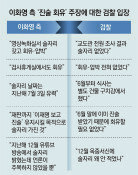Health advice for the new year
2014 is the Year of Blue Horse. A blue horse has been the symbol of strong dynamics. Like a running blue horse, many people expect a vibrant and hopeful new year. Health is important to have a good year. As Korea has distinct four seasons, people need to prepare for different seasons for health. Lets look at diseases and health risks in each season.
○ Spring: asthma and allergy rhinitis
Spring has respiratory problems such as asthma and allergy rhinitis. The gap between the highest and the lowest temperature is over 10 Celsius degrees and a sudden change to a warm weather causes the imbalance of the biorhythm temporarily.
Yellow dust from China is a problem, in particular. The frequency of yellow dust has decreased. Statistics Korea says that yellow dust continued for 25 days but it lasted for six days in 2012. However, the risk of small particles carried by yellow dust is getting more serious due to air pollution in China.
Small particles pose health risks to our body because they cause a heart or lung disease. Super small particles which are smaller than 2.5 micrometers or a hundredth of a strand of a hair, are not filtered by the nose or bronchial tubes and reach directly to the lungs and the heart. A study on cardiovascular patients in 2001 through 2010 based on the big data of the National Health Insurance Service showed that an increase of one micrometer per cubic meters in the air led to a 1.26-percentage point increase in hospital admissions.
○ Summer: food poisoning and strong ultraviolet rays
Food poisoning gets more rampant as the weather gets warmer. It is caused by food contaminated by bacteria such as staphylococcus, dysentery bacillus, salmonella and vibrio.
Although most bacteria causing food poisoning can be eliminated by high temperature, the poison in staphylococcus does not disappear even after boiling the food at 100 degrees Celsius for half an hour. Storing food in the fridge or boiled food does not guarantee safety from food poisoning. Experts stress the importance of personal hygiene such as washing hands before cooking or after using the toilet.
More people suffer from the side effects of ultraviolet rays in July and August after the monsoon season. The elderly and those with chronic diseases such as diabetes or low blood pressure should be careful about sunstroke and heatstroke because they might cause death. Sufficient water in the body can prevent a sudden death in summer.
People should be careful about skin burn from ultraviolet rays. Apply sun block on your face before going outside. Take your sunglasses and cap as well.
○ Autumn: febrile diseases
Febrile endemics like epidemic hemorrhagic fever, Tsutsugamushi disease, and leptospirosis are of concern in autumn. Their symptoms are mostly severe fever, headache, coughs, vomiting, and stomachache. They lead to death in some worst cases.
Last year, the severe fever with thrombocytopenia syndrome (SFTS) caused by tick bites hit Korea. The Korea Center for Disease Control said Korea had 35 SFTS patients across the country by the end of 2013. Seven people died from it and the death rate is up to 20 percent. There is no vaccine yet.
In addition, those who have sensitive skins are not happy with the season. The lack of humidity in the air causes psoriasis and atomic dermatitis. Those who have severe dry skin should take a shower with warm water and apply sufficient moisturizer on the skin.
○ Winter: cardiovascular and cerebrovascular diseases
The elderly who have weaker immunity are a concern in winter when the temperature drops. That is why it is often said that many people die in winter. Cardiovascular and cerebrovascular diseases are most common in winter. They are closely related to life. A cold weather makes blood vessels shrink and increases blood pressure. People with high blood pressure often take hypotensive drugs and reduce taking alcohol and salty food. A moderate aerobic exercise is good but spending long time outside in the cold air is not desired. A mix of fast walk and jogging for 30 minutes to an hour three times a week is recommended.







